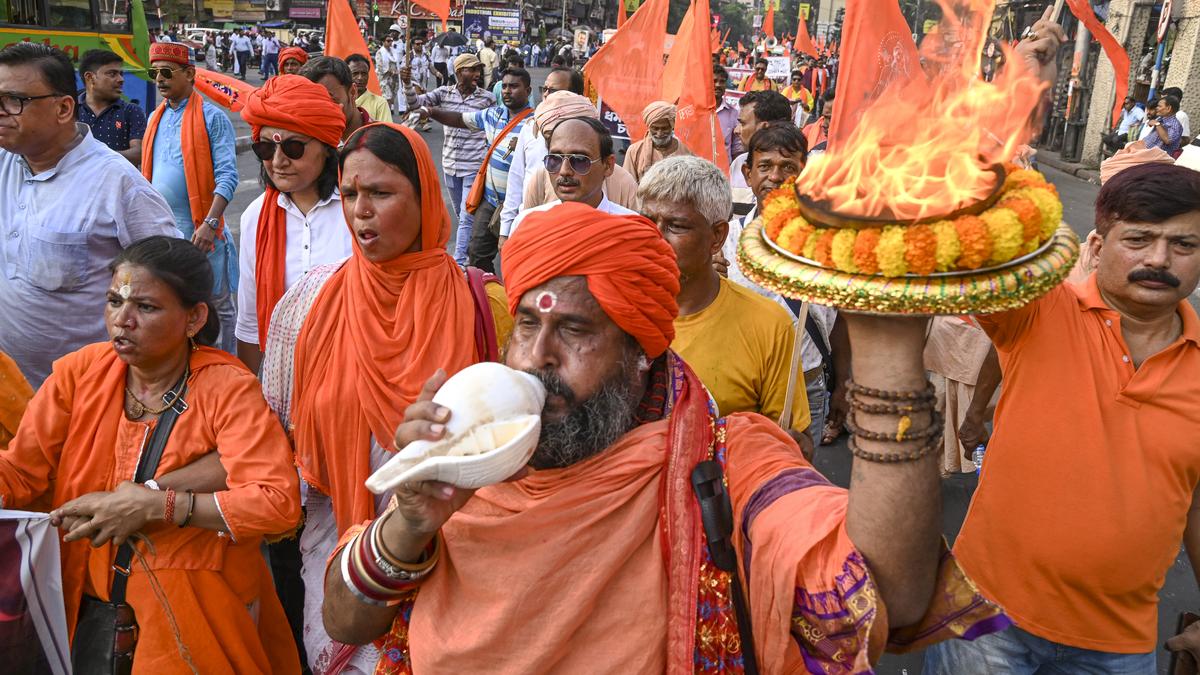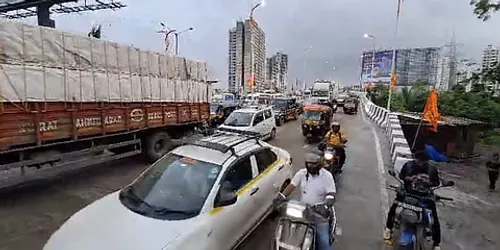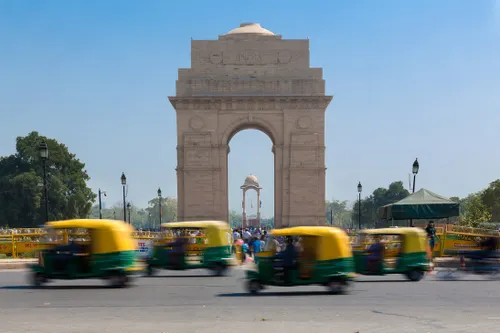
Vishva Hindu Parishad (VHP) activists during a protest rally condemning the Pahalgam terror attack, in Kolkata, Friday, April 25, 2025.
| Photo Credit: PTI
The return of four coffins from Kashmir to Bengal — three deceased of the Pahalgam terror attack and one soldier killed in Udhampur — has not only stirred grief, but also ignited a volatile mix of religion, politics and emotion — deepening polarisation and marking a turning point in the state’s identity politics.
With the 2026 assembly elections less than a year away, the killings have swiftly taken on a political charge, threatening to become the emotional nucleus around which competing narratives and electoral strategies will revolve.
Rise of communal politics
The brutal killing of tourists Bitan Adhikari, Samir Guha and Manish Ranjan Mishra in Kashmir, has sent shockwaves through the state.
The chilling nature of these targeted killings has thrust the politics of religious identity into the spotlight, with the faith of the victims now becoming a potent political tool.
As parties scramble to frame the narrative through religion, nationalism and victimhood, the deaths have transformed into a new battleground in Bengal’s fierce political contest.
Death of soldier Jhontu Ali Sheikh
The fourth coffin — of soldier Jhontu Ali Sheikh from Nadia killed in a separate ambush in Udhampur — has further complicated the emotional and political discourse, as martyrdom and terror are increasingly viewed through communal prisms.

The invocation of religious identity following the attacks has signalled a shift in Bengal’s political choreography — one that observers say is aligned with the BJP’s “ideological thrust” and the TMC’s “appeasement politics”.
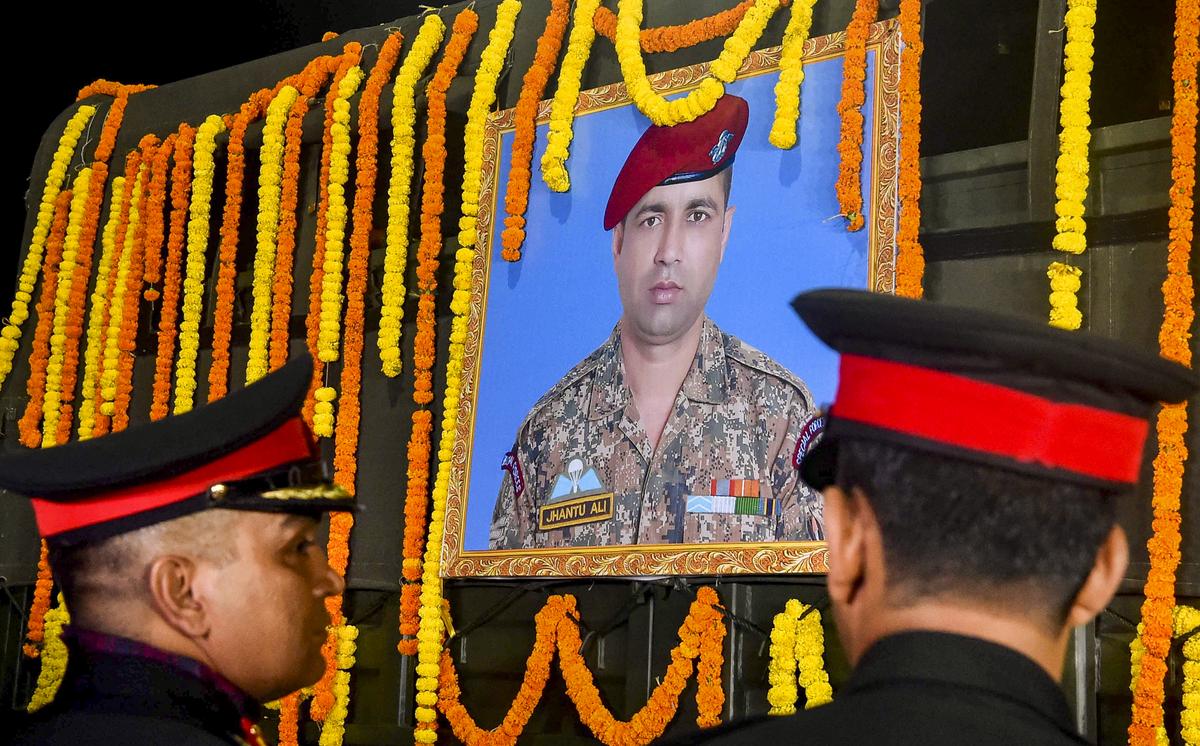
Army persoonel wait for arrival of the mortal remains of paratrooper Jhantu Ali Sheikh, who was killed in the Pahalgam terrorist attack, at the NSCBI Airport, in Kolkata, Friday night, April 25, 2025.
| Photo Credit:
PTI
“This isn’t just a story of terror and tragedy. It’s about the religious identity of the dead. We are now witnessing a contest of competing narratives, shaped by identity and political stakes,” political scientist at the Centre for Studies in Social Sciences, Maidul Islam, told PTI.
What unfolded at Kolkata airport on Wednesday evening highlighted the intensity of the moment.
As the coffins arrived, Leader of the Opposition in the West Bengal assembly, Suvendu Adhikari, and a large contingent of BJP leaders staged an emotionally charged appearance at the cargo terminal.
The TMC, though present at the airport through leaders like Firhad Hakim and Arup Biswas, appeared momentarily caught off-guard by the BJP’s theatrics.
Mr. Biswas met Bitan’s family and Hakim visited the home of another victim.
The TMC also sought to highlight the sacrifice of Jhontu Ali Sheikh, stressing that martyrdom knows no religion. But the BJP struck back sharply.
“The TMC is trying to equate a terrorist attack with the death of a soldier,” said state BJP spokesperson Keya Ghosh.
TMC veteran Sougata Roy, however, rejected the BJP’s framing.
“This is clearly a security and intelligence failure. The BJP is using this incident to stir communal sentiments ahead of the Bihar elections and next year’s Bengal polls,” he told PTI.
But the BJP remains unwavering.
“The Hindus of Bengal know that TMC panders to jihadis and fundamentalists for vote-bank politics,” said BJP state president and Union Minister Sukanta Majumdar.
Divisive edge in Bengal
Political analysts believe the Pahalgam killings have given the BJP’s Hindutva plank a significant emotional push — echoing the post-Pulwama sentiment of 2019, though with a sharper, more divisive edge.
“In Pulwama, martyrdom was a unifying force rooted in nationalism. In Pahalgam, it’s being interpreted through a religious lens, which is far more divisive,” said political scientist Biswanath Chakraborty.
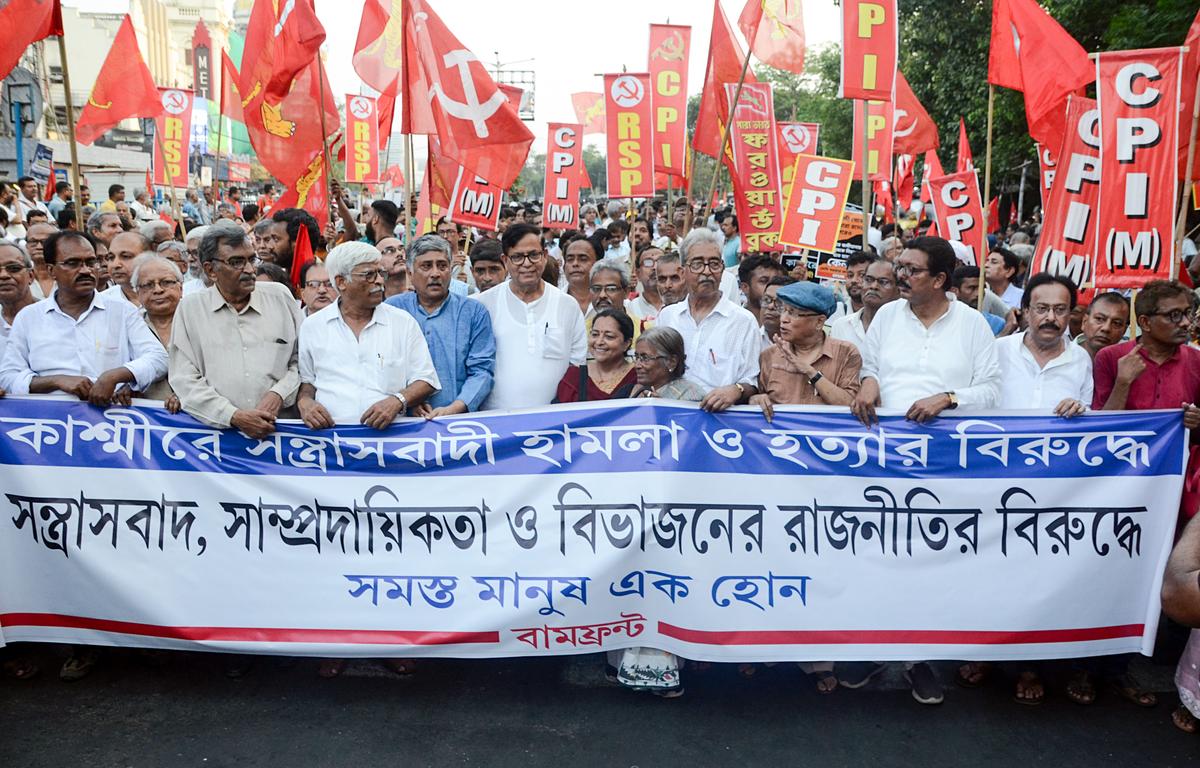
Left Front leaders take part in a protest rally against the Pahalgam Terror Attack, in Kolkata on Friday, April 25, 2025.
| Photo Credit:
ANI
“What happened in Kashmir is now being fought over in Bengal’s streets by the TMC and the BJP. The focus on religious identity is only going to deepen existing communal divides ahead of the 2026 assembly polls,” he said.
Another analyst echoed the sentiment. “The politics around the religious identity of the corpses will sharpen the state’s fault lines.” From the CAA-NRC protests to recurring incidents of communal violence in districts like Murshidabad, West Bengal has seen an uptick in religious tensions over the past few years.
Both the TMC and the BJP have capitalised on these fissures, portraying themselves as protectors of their respective vote bases — Muslims and Hindus.
Martyrdom can’t be used as fuel for hatred: CPI(M)
The Pahalgam episode may further deepen these divides, especially if the religious identity of the dead continues to dominate the narrative around terrorism and martyrdom.
The CPI(M) and the Congress, meanwhile, which find themselves politically sidelined in this increasingly polarised environment, have issued cautious appeals for restraint.
“One form of fundamentalism breeds another. We must not let martyrdom be used as fuel for hatred,” said CPI(M) leader Sujan Chakraborty.
But in Bengal’s high-stakes political arena, where optics often outweigh nuance, such cautionary voices risk being drowned out.
Published – April 26, 2025 12:12 pm IST
Anurag Dhole is a seasoned journalist and content writer with a passion for delivering timely, accurate, and engaging stories. With over 8 years of experience in digital media, she covers a wide range of topics—from breaking news and politics to business insights and cultural trends. Jane's writing style blends clarity with depth, aiming to inform and inspire readers in a fast-paced media landscape. When she’s not chasing stories, she’s likely reading investigative features or exploring local cafés for her next writing spot.
